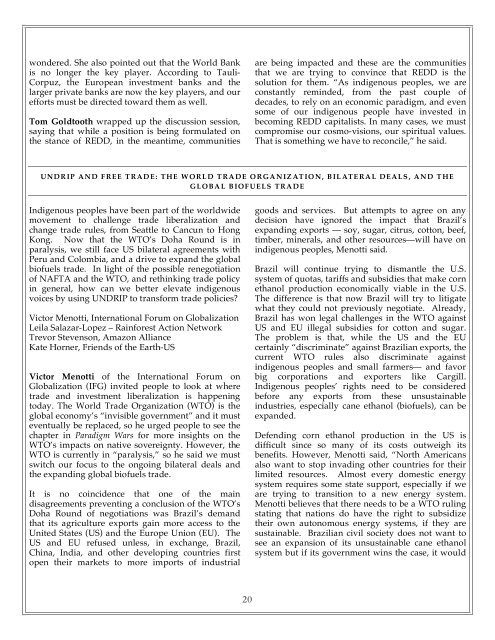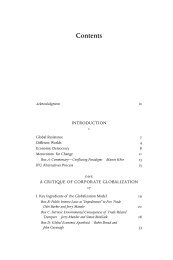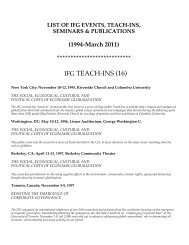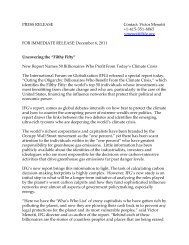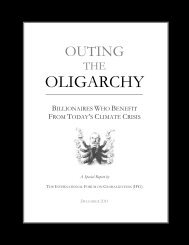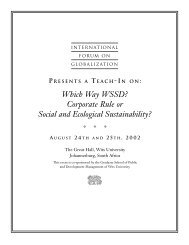UNDRIP Report - English FINAL - International Forum on Globalization
UNDRIP Report - English FINAL - International Forum on Globalization
UNDRIP Report - English FINAL - International Forum on Globalization
You also want an ePaper? Increase the reach of your titles
YUMPU automatically turns print PDFs into web optimized ePapers that Google loves.
w<strong>on</strong>dered. She also pointed out that the World Bank<br />
is no l<strong>on</strong>ger the key player. According to Tauli-<br />
Corpuz, the European investment banks and the<br />
larger private banks are now the key players, and our<br />
efforts must be directed toward them as well.<br />
Tom Goldtooth wrapped up the discussi<strong>on</strong> sessi<strong>on</strong>,<br />
saying that while a positi<strong>on</strong> is being formulated <strong>on</strong><br />
the stance of REDD, in the meantime, communities<br />
are being impacted and these are the communities<br />
that we are trying to c<strong>on</strong>vince that REDD is the<br />
soluti<strong>on</strong> for them. “As indigenous peoples, we are<br />
c<strong>on</strong>stantly reminded, from the past couple of<br />
decades, to rely <strong>on</strong> an ec<strong>on</strong>omic paradigm, and even<br />
some of our indigenous people have invested in<br />
becoming REDD capitalists. In many cases, we must<br />
compromise our cosmo-visi<strong>on</strong>s, our spiritual values.<br />
That is something we have to rec<strong>on</strong>cile,” he said.<br />
UNDR IP AN D F REE T RAD E: THE W ORL D T RA DE O RGA N IZ AT IO N, B IL ATE RA L DEALS , AN D T HE<br />
GLOBA L B IOF UELS TRA DE<br />
Indigenous peoples have been part of the worldwide<br />
movement to challenge trade liberalizati<strong>on</strong> and<br />
change trade rules, from Seattle to Cancun to H<strong>on</strong>g<br />
K<strong>on</strong>g. Now that the WTO’s Doha Round is in<br />
paralysis, we still face US bilateral agreements with<br />
Peru and Colombia, and a drive to expand the global<br />
biofuels trade. In light of the possible renegotiati<strong>on</strong><br />
of NAFTA and the WTO, and rethinking trade policy<br />
in general, how can we better elevate indigenous<br />
voices by using <str<strong>on</strong>g>UNDRIP</str<strong>on</strong>g> to transform trade policies?<br />
Victor Menotti, <str<strong>on</strong>g>Internati<strong>on</strong>al</str<strong>on</strong>g> <str<strong>on</strong>g>Forum</str<strong>on</strong>g> <strong>on</strong> Globalizati<strong>on</strong><br />
Leila Salazar-Lopez – Rainforest Acti<strong>on</strong> Network<br />
Trevor Stevens<strong>on</strong>, Amaz<strong>on</strong> Alliance<br />
Kate Horner, Friends of the Earth-US<br />
Victor Menotti of the <str<strong>on</strong>g>Internati<strong>on</strong>al</str<strong>on</strong>g> <str<strong>on</strong>g>Forum</str<strong>on</strong>g> <strong>on</strong><br />
Globalizati<strong>on</strong> (IFG) invited people to look at where<br />
trade and investment liberalizati<strong>on</strong> is happening<br />
today. The World Trade Organizati<strong>on</strong> (WTO) is the<br />
global ec<strong>on</strong>omy’s “invisible government” and it must<br />
eventually be replaced, so he urged people to see the<br />
chapter in Paradigm Wars for more insights <strong>on</strong> the<br />
WTO’s impacts <strong>on</strong> native sovereignty. However, the<br />
WTO is currently in “paralysis,” so he said we must<br />
switch our focus to the <strong>on</strong>going bilateral deals and<br />
the expanding global biofuels trade.<br />
It is no coincidence that <strong>on</strong>e of the main<br />
disagreements preventing a c<strong>on</strong>clusi<strong>on</strong> of the WTO’s<br />
Doha Round of negotiati<strong>on</strong>s was Brazil’s demand<br />
that its agriculture exports gain more access to the<br />
United States (US) and the Europe Uni<strong>on</strong> (EU). The<br />
US and EU refused unless, in exchange, Brazil,<br />
China, India, and other developing countries first<br />
open their markets to more imports of industrial<br />
goods and services. But attempts to agree <strong>on</strong> any<br />
decisi<strong>on</strong> have ignored the impact that Brazil’s<br />
expanding exports — soy, sugar, citrus, cott<strong>on</strong>, beef,<br />
timber, minerals, and other resources—will have <strong>on</strong><br />
indigenous peoples, Menotti said.<br />
Brazil will c<strong>on</strong>tinue trying to dismantle the U.S.<br />
system of quotas, tariffs and subsidies that make corn<br />
ethanol producti<strong>on</strong> ec<strong>on</strong>omically viable in the U.S.<br />
The difference is that now Brazil will try to litigate<br />
what they could not previously negotiate. Already,<br />
Brazil has w<strong>on</strong> legal challenges in the WTO against<br />
US and EU illegal subsidies for cott<strong>on</strong> and sugar.<br />
The problem is that, while the US and the EU<br />
certainly “discriminate” against Brazilian exports, the<br />
current WTO rules also discriminate against<br />
indigenous peoples and small farmers— and favor<br />
big corporati<strong>on</strong>s and exporters like Cargill.<br />
Indigenous peoples’ rights need to be c<strong>on</strong>sidered<br />
before any exports from these unsustainable<br />
industries, especially cane ethanol (biofuels), can be<br />
expanded.<br />
Defending corn ethanol producti<strong>on</strong> in the US is<br />
difficult since so many of its costs outweigh its<br />
benefits. However, Menotti said, “North Americans<br />
also want to stop invading other countries for their<br />
limited resources. Almost every domestic energy<br />
system requires some state support, especially if we<br />
are trying to transiti<strong>on</strong> to a new energy system.<br />
Menotti believes that there needs to be a WTO ruling<br />
stating that nati<strong>on</strong>s do have the right to subsidize<br />
their own aut<strong>on</strong>omous energy systems, if they are<br />
sustainable. Brazilian civil society does not want to<br />
see an expansi<strong>on</strong> of its unsustainable cane ethanol<br />
system but if its government wins the case, it would<br />
20


